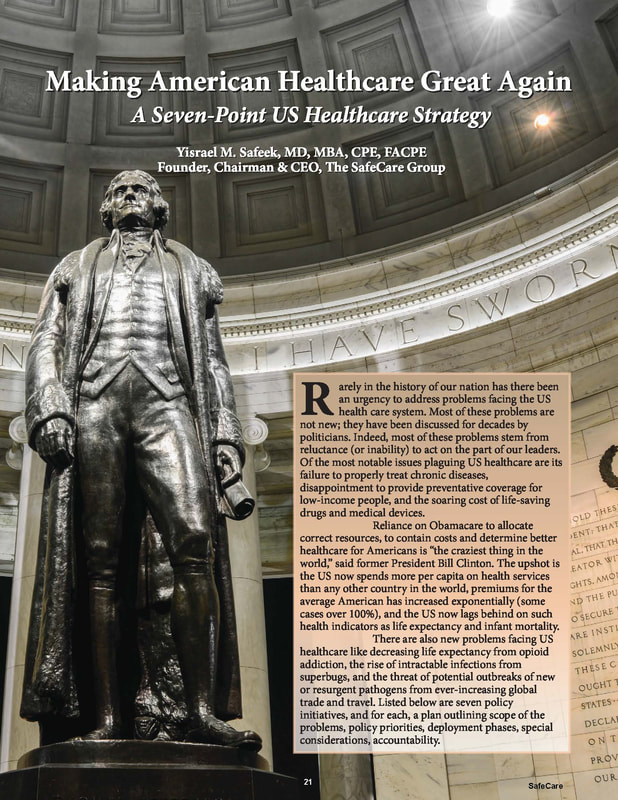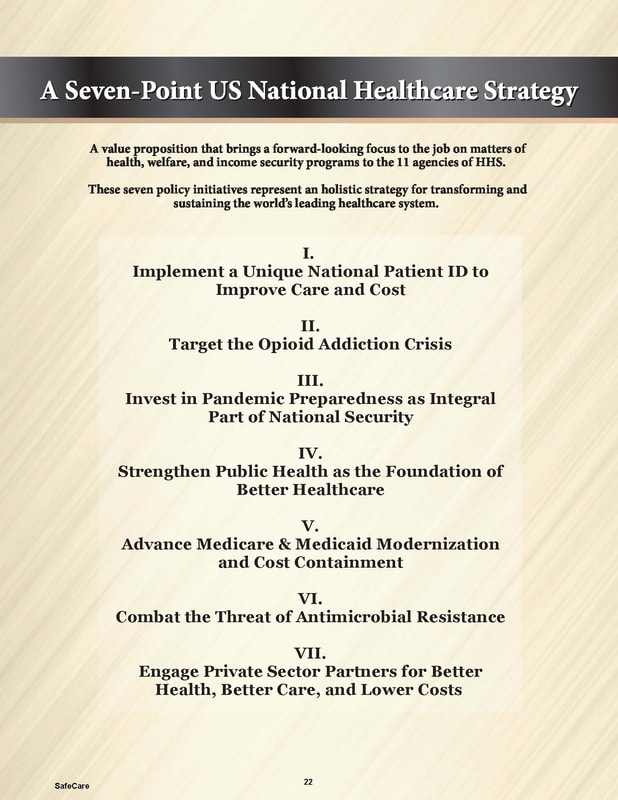Making Healthcare Great Again
The SafeCare Group's 7-point Initiative
By Yisrael M Safeek, MD, MBA, FACPE
The SafeCare Group's 7-point Initiative
By Yisrael M Safeek, MD, MBA, FACPE
USA
October 16, 2016
October 16, 2016
Rarely in the history of our nation has there been an urgency to address problems facing the US health care system. Most of these problems are not new; they have been discussed for decades by politicians. Most of these problems stem from a highly-fragmented US healthcare system, which due to reluctance (the inability) to act on the part of our leaders, led to a slow deterioration of our healthcare.
Some of the most notable issues plaguing the US healthcare system include:
There are also new problems facing the US healthcare system like
Some of the most notable issues plaguing the US healthcare system include:
- its failure to properly treat chronic diseases,
- disappointment to provide preventative coverage for low-income people,
- and the soaring cost of life-saving drugs and medical devices.
There are also new problems facing the US healthcare system like
- decreasing life expectancy from opioid addiction,
- the rise of intractable infections from superbugs,
- and the threat of potential outbreaks of new or resurgent pathogens from ever-increasing global trade and travel.
| POLICY | DESCRIPTION | SCOPE OF THE PROBLEM | POLICY PRIORITIES | DEPLOYMENT PHASES | SPECIAL CONSIDERATIONS | GOVERNANCE |
|---|---|---|---|---|---|---|
| Policy Initiative I | Implement a Unique National Patient ID to Improve Care and Cost | Lack of a common unique patient ID contributes to the fragmentation of the current health care system leading to disrupted relationships, poor information flows, and misaligned incentives that combine to degrade quality and increase cost. | ||||
| Policy Initiative II | Target the Opioid Addiction Crisis | Unintentional drug overdose has become the leading cause of injury-related death in the US. Drug overdose deaths in the United States more than tripled from 1999 to 2015, with over 52,000 drug overdose deaths occurring in 2015 alone. | ||||
| Policy Initiative III | Invest in Pandemic Preparedness as Integral Part of National Security | Ever-increasing global trade and travel increase the potential for outbreaks of new or resurgent pathogens to turn into epidemics or pandemics. Globalization drives economic growth but also facilitates the spread of contagion. | ||||
| Policy Initiative IV | Strengthen Public Health as the Foundation of Better Healthcare | Health Data administration and utilization is split across multiple state and local government jurisdictions, and this inefficient structure impedes innovation and lacks a clear point of healthcare. | ||||
| Policy Initiative V | Advance Medicare & Medicaid Modernization and Cost Containment | Our current health care system is fragmented in a way that leads to disrupted relationships, poor information flows, and misaligned incentives that combine to degrade quality and increase cost. | ||||
| Policy Initiative VI | Combat the Threat of Antimicrobial Resistance | Antimicrobial resistance may be the biggest healthcare threat to mankind and is a harmful consequences of antibiotic over prescription and the development of antibiotic-resistant organism, affecting more than 2 million Americans annually. | ||||
| Policy Initiative VII | Engage Private Sector Partners for Better Health, Better Care, and Lower Costs | The US spend more per person on health care than most developed countries, yet higher spending is not resulting in better health outcomes for American citizens. |


